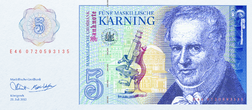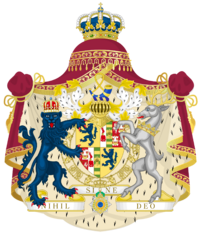Mascyllary Karning
| Karning (Hesurian) | |
|---|---|
 10 Karning banknote | |
| ISO 4217 | |
| Unit | |
| Plural | Karninger |
| Symbol | Ӄ |
| Denominations | |
| Subunit | |
| 1⁄100 | Gehlt |
| Plural | |
| Gehlt | Gehlter |
| Symbol | |
| Gehlt | ԍ |
| Banknotes | |
| Freq. used | 5Ӄ, 10Ӄ, 20Ӄ, 50Ӄ |
| Rarely used | 100Ӄ, 500Ӄ, 1000Ӄ, 10000Ӄ |
| Coins | |
| Freq. used | 10ԍ, 20ԍ, 50ԍ, 1Ӄ, 2Ӄ |
| Demographics | |
| User(s) | |
The Karning (Hesurian: [kar:ning]; plural: Karninger, symbol: Ӄ; ISO code: KN; also abbreviated as MKӃ) is the official currency of Mascylla. Both the ISO code "KN" and currency symbol "Ӄ" are in common use; the former precedes or follows the value, the latter usually follows it but, especially in the past, it sometimes preceded the value. In other languages, the currency is sometimes referred to as the Mascyllary crown, as Karning is a colloquial word meaning "king" in Low Hesurian. One Karning is subdivided into 100 Gehlter (singular: Gehlt, symbol: ԍ), the name possibly deriving from Low Alemannic Gelld meaning "gold coin". Altogether, there are eleven denominations of the Karning, with the smallest being the 10 Gehlt coin, which is valued at one tenth of a Karning. Other coins include the 20 and 50 Gehlt and the 1 and 2 Karning coins. The Mascyllary currency is sometimes referred to as bluestripes by foreign exchange traders and financial press abroad.
The Mascyllary Karning was the third most traded currency in the foreign exchange market in April 2017. It is also widely used as a reserve currency internationally, and was the fifth-most reserved currency in global reserves. The Great Bank of Mascylla is the central bank of the Karning, issuing its own banknotes, minting its coins, and generally regulating issuance of banknotes by private banks nationally.
